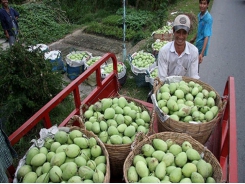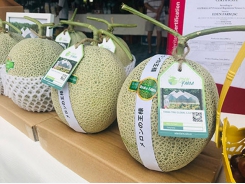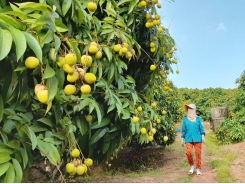From April 2021, rice exports have increased for the whole year

After a quiet first quarter of 2021, rice exports in April increased again. It is forecast that rice exports will continue to increase thanks to the high demand from the world market.
Illustration. Source: Internet
Speaking at an online conference to promote agricultural product consumption during the Covid-19 pandemic on May 14, Mr. Nguyen Quoc Toan, Director of the Department of Agricultural Product Processing and Market Development (MARD), said in the first four months of 2021, rice exports were estimated at 1.9 million tons, worth US$1.01 billion, down 10.8% in volume but up 1.2% in value.
Notably, the average export price reached US$534/ton, up 13.4% compared to the same period last year.
"After the first quarter of 2021, rice exports in April started to increase again in the context of increased rice supply due to the winter-spring rice harvest," said Toan.
Leaders of the Department of Agricultural Product Processing and Market Development said that in the future, rice exports will continue to increase. Because the demand from the world market is still high; especially from big markets such as Philippines, Malaysia, China, Gana, Papua New Guinea all increased sharply. The main export markets have continued to sign contracts to buy Vietnamese rice.
In addition, unfavorable weather conditions, droughts and floods greatly affect production, leading to a decrease in food production in many countries like Bangladesh. The impact of the Covid-19 pandemic has increased demand for food in many countries.
Mr. Nguyen Quoc Toan also mentioned that Vietnam is controlling the Covid-19 pandemic and has an abundant and stable supply of rice, rich in variety, meeting the requirements of many markets.
Some major exporting countries faced difficulties, typically in India - the world's largest rice exporter, the rupee weakened and the second wave of the Covid-19 pandemic with a sharp increase of the number of infections had an impact on logistics, from milling to transporting rice to the port. The price of Indian 5% broken parboiled rice continued to decrease and in the second half of April 2021, it fell from US$386-390/ton to US$374-379/ton, touching the lowest level in five months.
Similarly in Thailand, rice exports faced many difficulties and continuously declined in recent years due to high prices, rising baht, and lack of containers.
Bangladesh, the world's third largest rice producer, is emerging as a major rice importer after successive heavy rains caused crop damage and was suffering a new wave of pandemic and extended blockade time.
"In 2020, Vietnam has expanded and diversified its export markets through FTAs such as the Vietnam-EU FTA (EVFTA), the Vietnam-UK FTA (UKFTA). In 2021, with the preferential tax rates in the above agreements, Vietnamese rice will have competitive advantages and growth opportunities in the EU, UK and Eurasian Union markets," said Mr. Nguyen Quoc Toan.
Besides advantages, the leader of the Department of Agricultural Product Processing and Market Development also pointed out many difficulties in exporting rice. First of all, it is limited in production and processing when rice production is still unsustainable, subject to many risks due to climate change, natural disasters, drought, saltwater intrusion, and floods.
In addition, the production scale of smallholder farmers and mechanization is difficult. The link between businesses and farmers in many places is not sustainable. The number of enterprises participating in the association contracts to consume agricultural products is small in number, small in scale, and limited in capacity. Therefore, the affiliate contracts are limited in both quantity and quality.
According to some experts, the lack of infrastructure and technology to preserve and process agricultural products increases losses and reduces quality during storage. The industry of deep processing of rice products has not developed uniformly, which is also a typical difficulty in the production and export of Vietnamese rice.
Along with that, Vietnam's rice exports are affected by many factors such as global supply and demand; the policy change of the import market; competition from competitors.
Có thể bạn quan tâm
Phần mềm

Phối trộn thức ăn chăn nuôi

Pha dung dịch thủy canh

Định mức cho tôm ăn

Phối trộn phân bón NPK

Xác định tỷ lệ tôm sống

Chuyển đổi đơn vị phân bón

Xác định công suất sục khí

Chuyển đổi đơn vị tôm

Tính diện tích nhà kính

Tính thể tích ao hồ




 Lychee going digital thanks to Vietrade’s online tie-ups
Lychee going digital thanks to Vietrade’s online tie-ups  Bac Giang focuses on pandemic prevention and online…
Bac Giang focuses on pandemic prevention and online…